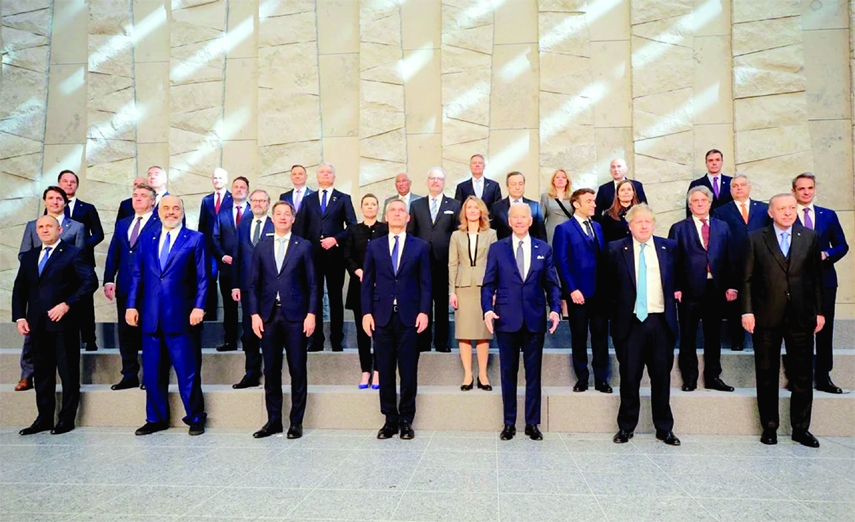
News Desk :
NATO leaders launched an extraordinary summit on Thursday to assess how they can give Ukraine more support to defend against the invasion of Russia, and support a new strengthening in the eastern part of the Alliance with four new battalions in Bulgaria, Romania, Hungary and Slovakia.
The heads of state and government of the 30 allies are meeting in Brussels to show unity in the face of the aggression ordered by Russian President Vladimir Putin, in a meeting in which Ukrainian Volodymir Zelensky will also participate by videoconference, report agencies.
“We are united in condemning the Kremlin’s unprovoked aggression (…) and determined to continue to impose costs on Russia to end this brutal war,” which is one month old today, allied secretary general Jens Stoltenberg said at the beginning of the meeting.
US President Joe Biden intends to boost unity and reinforce sanctions on Moscow on a day of summits in Brussels, in which the West responds to the Kremlin’s attempt to upset the post-cold-war balance.
“Vladimir Putin has already crossed the red line to barbarism,” said British Prime Minister Boris Johnson, upon the arrival of NATO leaders for a meeting and a month into the war. “The tougher our sanctions, the harder our economic vice around Putin’s regime, the more we can do to help Ukrainians, I think the faster this can be over,” he said.
Estonian Prime Minister Kaja Kallas called on the alliance of 30 countries to “redouble its efforts” to curb the Kremlin’s aggression against its pro-Western neighbor. “Putin cannot win this war,” he said. “We have to stop the war criminal.”
Ukrainian President Volodymir Zelensky, whose country is not in NATO, was going to appeal for more advanced weaponry and more intervention in a video speech to the leaders, while trying to cajole the
West into a tougher response. “We are waiting for significant steps to be taken. From NATO, the EU and the G7?, Zelensky said ahead of the summits of the three organizations in Brussels. “In these three summits we will see: Who is a friend, who is a partner and who has betrayed us for money. Life can only be defended when it is united.”
NATO leaders pledge to strengthen the supply of weapons to Ukraine and to provide protection against Russia’s chemical and nuclear threats. “We are determined to continue to impose costs on Russia to bring about an end to this brutal war,” said NATO chief Jens Stoltenberg.
But the alliance has rejected Kiev’s requests to impose a no-fly zone to help curb the Russian onslaught for fear of being drawn into a “full-fledged” conflict with Moscow. “We have a responsibility to ensure that this conflict does not spread beyond Ukraine, which will cause even more suffering, even more death, even more destruction,” Stoltenberg said.
He accused Putin of making a “big mistake” in attacking Ukraine and underestimating the strength of Kiev’s resistance, as his forces have slowed Moscow’s advance.
Stoltenberg said the leaders of the US-led military alliance “will address the need for a readjustment of our long-term deterrence and defense,” starting by agreeing to new deployments in the eastern members, Romania, Hungary, Slovakia and Bulgaria.
NATO has already deployed tens of thousands of troops on its eastern flank following the Russian invasion to counter the threat of the conflict spreading to the alliance countries.
Before traveling to Europe, Biden warned of the “real threat” that the Kremlin could use chemical weapons in Ukraine.
Stoltenberg told journalists that “any use of chemical weapons would fundamentally change the nature of the conflict.” “It will be a flagrant violation of international law, and it will have widespread and serious consequences.”
The leaders refused to elaborate on how NATO would react if Moscow unleashed chemical weapons against Ukraine.
“Personally, I don’t think that the Russian military themselves will use chemical or biological weapons on purpose for tactical achievements, because this would be… very reckless and a shot in their own knee,” said Slovenian Prime Minister Janez Jansa.
NATO allies are also going to pressure China to abandon what they consider their “political support” to Russia, fearing that Beijing may start supplying military equipment to Moscow.
“I think the messages to China have been very, very clear,” said Belgian Prime Minister Alexander De Croo: “Please keep your distance and so far China has done so.”

